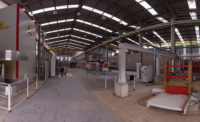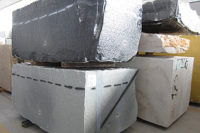
Comprised of four stone companies in Northern Italy,
the Alberti Group offers a broad range of unique materials. Marble, travertine
and onyx are processed at the group’s Alberti & Alberti facility, which has
the latest generation of stoneworking technology and treatments.
Comprised of four stone companies within the Alberti family - all of which are in Northern Italy - the Alberti Group prides itself on offering a range of materials not easily found elsewhere in the marketplace. It has separate slab-processing facilities for granite as well as for marble, travertine and onyx, and it has invested in the latest generation of technology - which allows it to work with virtually any stone material in the world.
All of the Alberti Group’s production begins with block processing, as granite blocks are cut at Alberti Graniti in Sant’ Ambrogio di Valpolicella, Verona, and marble blocks are cut at A.G.V. in Volgarne, Verona.
In terms of slab processing, Alberti & Alberti in Cavaion Veronese, Verona, produces slabs of marble, onyx and travertine from all over the world - and it is continually looking for new materials. Meanwhile, Industria Marmi Alberti in Ala, Trento, produces and exports calibrated granite slabs to markets around the world for kitchen countertop production.
The company’s granite production has been in place since 1960, and the Alberti Group has been working with marble for the past seven years.

One of the latest developments at the factory is the
use of Glaxs, a new resin technology from Tenax that offers long-term
protection against yellowing due to sunlight exposure. This is particularly
useful for use on white or other light-colored materials. Pictured here is an
application of Glaxs on Rhino White marble from Africa.
Marble Slab Production
Slabs of marble, onyx and travertine are processed at the group’s Alberti & Alberti facility, which sits on an area of 172,000 square feet and has 6,500 square feet of covered area. In this factory, slabs are polished as well as treated with resin and other reinforcements, and the company has invested in the latest technology - in terms of equipment as well as material treatments.In terms of equipment, the factory operates a full-scale resin-application plant from Breton S.p.A. of Italy. This includes an automated resin-application line with two large-scale driers as well as Levibreton polishing lines for honing as well as final polishing.
One of the latest developments is the use of Glaxs, a new resin technology from Tenax. Considering the fact that sun and heat tend to yellow resin-treated material - which can be particularly evident on white or other light-colored materials - Tenax’s R&D Department developed a new product that offers guaranteed long-term transparence. The Glaxs resin has undergone a series of aging tests according to ASTM standards. According to Tenax, these results have shown a strong yellowing of epoxy resins, while the Glaxs resin has confirmed resistance to yellowing with high transparency. The product also has low environmental impact, Tenax reports, as it contains no solvents, is not corrosive and does not release irritating fumes.
The Glaxs resin is applied in the same manner as a traditional resin - after the honing application is completed - and Alberti & Alberti uses it to reinforce white materials such as Rhino White from Africa.
When working with colored materials, Alberti & Alberti uses a range of colored polyester resins, primarily for filling the holes in travertine.
The resin line can produce 10,750 square meters of material during an eight-hour shift, while the polishing line can process 13,000 to 14,000 square meters of material per shift. Among the factory’s export targets, the U.S. imports a percentage of Alberti & Alberti’s marble production.

The Alberti & Alberti factory uses a range of
Tenax products for reinforcement, and they are applied to marble, travertine
and onyx as needed.
Granite Slab Production
Located beyond the vineyards of Valpolicella, the group’s Industria Marmi Alberti is responsible for all granite polishing and resin treatment. The plant, which sits on an area of 215,000 square feet and has 54,000 square feet of covered area, offers more than 100 varieties of granite.The slabs are first calibrated on a Simec honing machine, which features eight fixed working heads equipped with abrasives from Tyrolit Vincent.
From there, the granite slabs are “flipped” and then delivered to a Simec polishing line, which features 22 polishing heads equipped with Tenax abrasives. The plant has an optimal level of automation, as slabs are loaded and unloaded using robotic vacuum lifters.
Industria Marmi Alberti produces approximately 7,500 square feet of granite slabs per day, and 95 percent of production is exported. Much of these exports are sold in Northern Europe and Switzerland.

A Levibreton KFG from Breton is used for final slab
polishing of marble.

Bookmatching is a company specialty - particularly for
marble and onyx materials.
The group’s Industria Marmi Alberti is responsible for
all granite polishing and resin treatment.

Final granite polishing is completed on a Simec line,
which features 22 polishing heads equipped with Tenax abrasives.

Industria Marmi Alberti produces approximately 7,500
square feet of granite slabs per day, and 95 percent of production is exported.




